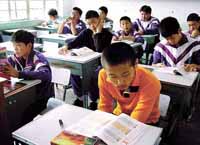 Tang Wenbing's students are among the smartest in the city of Shanghai: they're clever enough to conceal contraband cigarettes and snacks, savvy enough to escape from school through windows, sharp enough to deceive their teachers.
Tang Wenbing's students are among the smartest in the city of Shanghai: they're clever enough to conceal contraband cigarettes and snacks, savvy enough to escape from school through windows, sharp enough to deceive their teachers.
They weren't smart enough to escape being caught, however. The students at Tang's Yuying Middle School are juvenile delinquents, aged 12 to 18. They're here because they have stolen, robbed, played truant or fought.
Yuying is by no means the only school for juvenile delinquents in Shanghai. The city has 13 of these schools, housing a total of more than 2,000 juvenile delinquents defined as minors who have broken the law, but not seriously enough to be imprisoned.
These "problem children" are sent to live at the reformatories five days a week, so that they may complete the nation's nine-year compulsory education in an environment which prevents them from committing additional crimes.
It's a tall order, but the teachers are up to it. The schools have been a qualified success: according to the Shanghai Education Commission, more than 27,000 juveniles have graduated from the schools for youthful offenders since 1977, and among these, 10,000 went on to further education, with 40 attending university and hundreds joining the army.
The role of the teachers in the success of these schools cannot be understated. It takes a very special individual to teach troubled children, and dedicated teachers like Tang Wenbing are a rare mix of tough guy, saint, father - and, says Tang, detective.
"It's an interesting job," he says, "nothing ordinary about it. One of the first things I had to hone was my investigative skill," says Tang, his face weathered with wrinkles. "We forbid students to bring snacks, money or cigarettes into school but they try to elude detection in some rather clever ways."
"They hide cigarettes on the ceiling fans in winter, in holes on desks covered with waste paper, or in slots of suitcases. I once found a knife and a short club under the pillow of a boy who had decided to teach another boy a lesson," he adds. "We need to be psychologists as well, observing behavior. If a bad egg abruptly becomes obedient, he's probably planning something."
The tall and robust man says that his strict demeanor is a plus for the job. "When Mr. Tang took over my class, I thought we were in for a rough time because he looks so stern and frightening. But gradually, we learned that he really cares about us," says Xun Qing, a model student in Tang's class.
Tang's dedication doesn't go unnoticed: "Mr. Tang spends most of his time at school, so his wife and daughter have to come to school to visit him," reports Xun. "No matter how the weather is, he plays football with us every Friday afternoon and buys us snacks every month."
But not all students appreciate the efforts that the teachers make. Several are accomplished escape artists, able to squeeze through iron railings or wriggle out narrow transom windows.
"Once, to prevent a boy who had previously escaped from fleeing, I blocked the door of his room. His father was due to take him home for the weekend - it was Mid-Autumn Festival, the traditional time for family reunions - and he agreed to go, but asked to use the bathroom first," says Tang, noting that many of the children come from broken homes and are not keen on the visits. "We waited and waited for him to come out of the toilet until it dawned on us that he had gone - probably escaping from the toilet's window to the platform below."
Jiang Zengjun, a teacher at Pengshun Middle School in Zhabei District, acknowledges that her students are generally street smart. "One of my students can draw a detailed map displaying 24 Internet cafes in his neighborhood," she says. "In the past, students were required to study academics two and a half days a week, while the rest was spent on work activities design to give the students some basic skills, such as bicycle assembly, packaging products, and folding paper napkins."
Zhang Youlian, a teacher at the Xinhui Middle School, is constantly impressed with her charges' street-level intellect. "I found they were extremely clever. They could cheat their teachers, friends and parents!"
A graduate of the Shanghai Teachers University, Zhang was promised by the city education authority a better school if she would teach at Xinhui for two years. She ended up teaching there, however, for 13 years.
Recognizing that many juvenile delinquents come from broken homes where discipline is lacking, the educators make a special effort to create a family atmosphere.
"When a student who has escaped is returned, all the students and teachers gather in the playground and welcome him back. The warm reception can remove the fear of the student and show the warmth of the group," says Liu Yuzhong, who teaches at Xinhui Middle School in Luwan District.
In a similar vein, Yuying Middle School makes an effort to encourage students who would have seldom received academic commendations in the past. Each month, at a special assembly, students who show progress are presented with certificates of merit, red paper flower badges, and are photographed.
Nevertheless, the student's work is missing from their academic records - but this time, there's a good reason. "All students' files are sealed and remain at the school," explains Wei Baodi, deputy headmaster of the Yuying Middle School. "The students get a graduation certificate, of course, but we don't want their mistakes following them around. People make mistakes during the difficult teen years; that's perfectly understandable. Our job is to load these lost ships with plenty of love, and set them on course again."
(eastday.com December 24, 2001)
